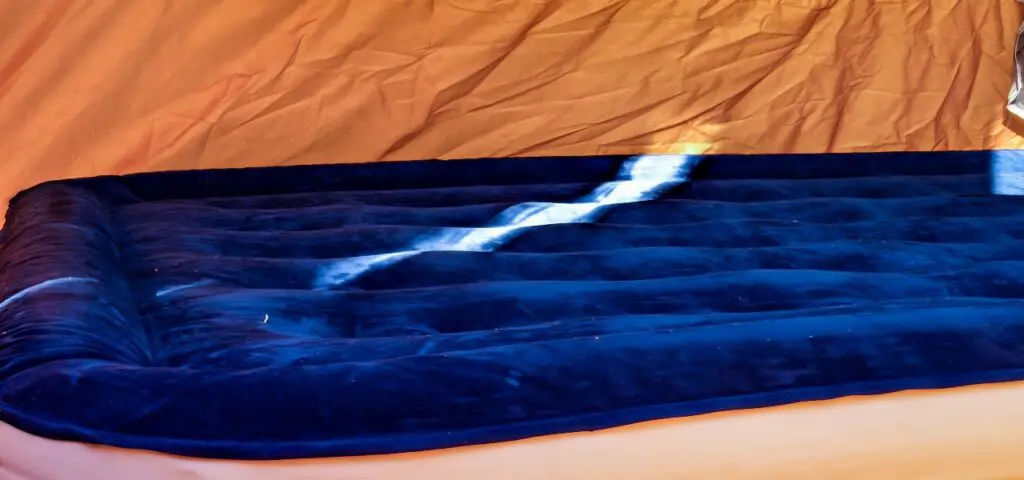
Picture the scene…
You lay out your sleeping bag on a firm, comfortable air mattress and drift off contentedly to sleep. But then the dreams start. You’re sinking into quicksand, enveloped slowly by a creeping tide of Jell-O, adrift at sea on a life raft that’s slowly submerging as the sharks take bites out of it… and why are you so cold down one side?
You wake up with a start. It’s 4.30am, and your deflated air mattress billows around you like a shrapnel-damaged bouncy castle. Your hip and shoulder are firmly on the floor, and the cold from the ground has seeped into your bones.
How has this happened? And how can you make sure it doesn’t happen again?
- If your air mattress has a leak, it’s important to know how to find and fix it.
- Sometimes changes in temperature can make your air bed deflate in the night.
- We know you don’t want to hear it, but sometimes it’s just because you bought a cheap air mattress.
- You might be using the wrong sort of air bed. Some are designed for indoor use, while others are specially constructed for camping.
- Overloading or over-inflating an air bed can make it leak.
- Storing your air mattress incorrectly can degrade the material and cause weaknesses to develop.
Leaks
When air mattresses deflate overnight, leaks are the most obvious culprit. Even the best air mattresses are vulnerable to air leaks, whether it’s through unfortunate encounters with sharp objects or just the wear and tear of life on the trail.
Fixing Leaks
Most decent air beds will come with a repair kit, normally comprising glue and patching material. Sometimes the patches themselves may be self-adhesive.
Of course, to fix the leak, you need to find it first. Sometimes the puncture will be obvious — but if not then you’ll need to try another tactic. The stock method is to use soapy water, either in a spray bottle or on a sponge.
- Start by applying the soapy water to the valve area and seams of the inflated air mattress, where leaks are most likely to be lurking.
- Watch for bubbles, which will indicate the site of the leak.
- If you don’t have any joy, move onto the rest of the air mattress until you find the puncture.
- Mark the leak with a pen.
- Wipe the soap off and let it dry before you fix the puncture.
This method works well if you’re car camping — or fixing a guest air bed in your own home — but if you’re a thru-hiker out for weeks or months at a time, you may just have decided to leave your spray bottles and dish soap at home (and we’d be with you on that). If you find your air mattress deflating on the trail, you might have to try some other tricks.
- Listen. Often the escape of air may be audible.
- Look. When the air mattress is inflated to its limit, even a tiny pin hole might be visible.
- Feel. Pass your hand along the seams, valve, and main body of the mattress, paying attention to the sensation of escaping air. It can help to wet your hand slightly.
- Do the flicker test. Pass a very fine piece of material (the plastic from a thin grocery sack works well) over the seams and surface of the fully inflated air bed, watching carefully. Even the tiniest jet of air escaping should cause it to flicker, revealing your air mattress leak.
- Submerge. If all else fails, you can fully inflate your air bed then submerge parts of it in a pool or lake and look for bubbles.
Before you can effect a repair, you’ll need to make sure the mattress is completely dry, otherwise the patch won’t stick properly.
Don’t be stingy with the glue or the material, but equally don’t use it all at once if you can help it. You can bet your bottom dollar you’ll have another puncture the following night if you do.
If you don’t have an air mattress puncture repair kit, you can also improvise one from duct tape or any sturdy plastic material held in place with a decent waterproof glue. Bike tire repair kits work well too.
Avoiding Leaks
There are a few ways you can militate against air leaks, especially when you’re in the mountains:
- Use a good-quality air mattress that’s designed for outdoor use.
- Pay attention to the ground you’re laying it out on.
- Be aware of sharp or hot objects. Crampons, ice axes, and hiking poles have killed many an air mattress – but so have hot cook pots fresh off the stove.
- Store your air mattress properly and don’t overload it (see below).
Temperature Fluctuations
How well do you remember your high school science? Because colder temperatures might also be the reason your air mattress is deflating in the night.
Hot air expands, cold air contracts. It’s the same reason you’re supposed to check the tire pressures on your car before you set off. As the tires warm up, the air inside them expands and the pressure goes up.
The reverse is true when air mattresses deflate overnight. If you inflate yours on a warm evening, then the temperature drops significantly in the night, the air inside the mattress will decrease in volume and it will go soft.
Unfortunately, there’s not much you can do about this, except to pump it back up. Just remember that if the following day is a hot one, you’ll need to let some of the air out again if you want to avoid stressing the seams.
Cheap Air Mattresses
Buy cheap, buy twice — or so the old saying goes.
Honestly, in many cases if your air mattress deflates overnight, it’s probably because it’s not up to the job. That might be because you’ve bought the wrong sort of air bed, or just because you’ve bought a super-cheap one online or at the gas station.
Cheap air beds aren’t built to last, and even a new air mattress will often lose air pressure in the night. The seams aren’t properly sealed, the valves are flimsy, and the shell material soon breaks down when exposed to temperature changes, abrasion and UV.
If your cheap air mattress is leaking air permanently in the night whatever you do, then you’ve got two options. Buy a new air mattress, or live with it.
Wrong Sort of Air Mattress
Sometimes it might not be that you’ve skimped on your air mattress — just that you’ve bought the wrong type.
Some air beds — particularly the models with the flocked vinyl surface and the plug-in electric pump — are designed for use within the home. They’re essentially an extra guest bed for when you’ve got the whole extended family staying for the holiday season, and they’re great for that.
What they’re not great for is camping. Because they’ve got more air in them, they’ll sag more as the temperature drops, and the material just isn’t designed to withstand the rigors of outdoor life.
If you’re taking your air mattress camping, you need one that was designed for that purpose.
Picking the Right Air Mattress for Camping
When you’re looking for a camping-specific air mattress, you might want to consider some of the following factors:
- Weight. Camping air beds tend to be a lot thinner and lighter than indoor ones.
- Warmth. Camping mats are usually insulated, while indoor ones aren’t, and you can get an idea of how well insulated the mattress is by looking at the “R rating.” We’ve got loads more information about this in our blog on How to Stay Warm On an Air Mattress.
- Durability. Camping air beds are designed to take a lot of punishment. However, even the most robust air mattresses are prone to leaks. For this reason, many hikers prefer self-inflating mattresses — which combine foam and air chambers. In general, self inflating sleeping pads are usually warmer and more durable than air mattresses but not quite as deep or lightweight.
Since we’re on the subject, an air bed isn’t your only option for camping, and you might want to check out our guide to Air Mattress Alternatives.
Too Much Weight On the Mattress
Most air mattresses will have a body weight limit, and it’s worth checking what that is. It’s not that you won’t be able to find a suitable mattress if you’re a bit larger, but the really lightweight ones sometimes aren’t built to take as much weight.
Actually, it’s not usually the weight of a sleeper that will wreck an air mattress — it’s overloading them with more people than they’re designed for. Something to ponder when four of you decide to sit on one for a game of cards.
Overfilling
Much like overloading the mattress, overfilling an air bed can damage it too. Excess pressure can stress the seams and damage the valve, especially if you then put weight on it or leave it in a hot place where the air inside expands.
Fortunately this is harder to do because many air beds have clever valves that will vent extra pressure once the mattress is full. However, if yours is a more old-fashioned one with a simple inflator valve, you’ll need to be careful.
Faulty Valve
The weak points in an air mattress are the seams and the valve, and either of these can make air mattresses deflate overnight. The valve is particularly vulnerable because in many cases it will contain movable components and seals that are easily damaged or dislodged, along with harder plastic that can go brittle with age and heavy use.
You can try to guard against valve damage by being extra careful as you’re filling or deflating the bed. Be careful not to damage the threading on screw-in hoses, and don’t over-tighten things.
If your valve has already gone faulty and you’re losing air, some manufacturers may offer replacement parts. On other occasions you may have to replace the whole air mattress.
Incorrect Storage
Sometimes it’s not the way you use your air mattress that causes weaknesses and punctures — it’s the way you don’t use it.
Storing your air mattress incorrectly can cause the material to deteriorate, while repeated folding along the same lines can make faults develop. For this reason, you should always follow the manufacturer’s storage instructions in the user manual.
In most cases, it’s better to store the air mattress laid flat (for example, under a bed) and loosely inflated — and of course you’ll want to make sure it’s not subjected to damp conditions or extreme temperatures.
FAQs
Why Does My Air Mattress Keep Deflating Overnight?
Leaks, colder temperatures at night, and faulty valves can often be the culprit if your air mattress keeps deflating — and cheaper models tend to be more prone to these things.
Why Is My Air Mattress Losing Air but No Hole?
If you definitely can’t find a hole or a fault with the valve then it may just be a drop in temperature overnight which is making the air inside your mattress reduce in volume.
How Do I Stop My Air Mattress from Deflating?
To start with, you need to buy a decent air mattress, since cheap models always seem to lose pressure during the night. It’s also worth looking for leaks and checking the valve to make sure it’s not faulty.






